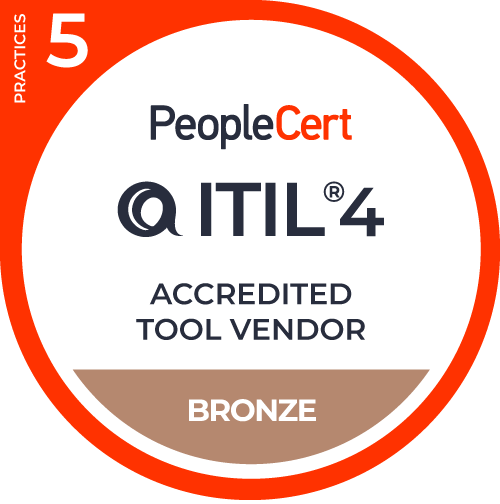As businesses grow, so does the demand for effective IT management. One crucial role in this area is the service desk manager, a position that ensures IT support runs smoothly while meeting organizational goals.
A service or help desk manager will overview all the activities around the help desk: from workload management to fostering motivation among team members, the person behind this role deploys a set of strategies and tools essential for maintaining productivity, minimizing burnout, and delivering exceptional service.
We hope this quick guide can support you through the job-hunting process so you can work on anything you need to improve before applying to open positions. Or, if you are on the other side, it will surely give you some insight into what it takes to find an optimal team leader to take your help desk to success.
Let’s get started.
What is a service desk manager?
A service desk manager oversees the daily operations of a company’s IT service desk. Help desks are the point of communication between customers and companies, helping customers understand and use the organization’s products and services. A similar relationship exists between a service desk and company employees; they help employee productivity by offering IT services in a timely manner.
Help desk managers are team leaders who actively tailor and update service desk initiatives so that members of the service desk staff can gel together in a more efficient and cohesive way. This includes things such as looking at metrics to benchmark staff performance, sharing and documenting said performance reviews with higherups, and being aware of the service desk operations budget in the grand scheme of things.
The position requires strong leadership, technical expertise, and a strategic mindset to ensure IT services align with organizational goals.
Service desk manager duties
In an organization, it’s the help desk manager’s responsibility to ensure that the employees’ and customers’ queries are resolved on time and to high user satisfaction. The help desk manager plays a vital role in maintaining customers’ and employees’ relations and perceptions towards the organization.
A major part of a help desk manager’s duties is managing the help desk employees on its different levels and relaying the communications from the company’s executives to the service desk agents. They have to understand the company’s goals and vision, its future plans, and the role of the service desk in the company.
The service desk manager has to coordinate with the stakeholders and come up with the service level agreement detailing the scope of IT services to be delivered. They’ll also have to come up with the KPIs and performance metrics for the service desk, and detail how they will be measured.
They must also act as a communication channel between the stakeholders and the service desk team, convey this message, and support the company in its vision.
Help desk managers also develop help desk processes, document and audit them, and ensure that they meet relevant industry standards and regulations. They are responsible for continuously analyzing these workflows and performance metrics and implementing strategies to improve them and make them more efficient and streamlined.
Here's a breakdown of a service desk manager's key responsibilities:
- Supervising help desk staff and providing training or mentorship.
- Ensuring timely responses to support tickets and escalations.
- Developing procedures to improve the help desk's efficiency.
- Managing hardware or software inventories and resources.
- Monitoring performance metrics to evaluate team productivity.
Lastly, let's not forget about the soft skills for the service desk manager role. Firstly, they have to be effective communicators. Just like any other kind of manager, they have to be clear in voicing suggestions and concerns about how things are going in the workspace.
This also ties into the team player and service-oriented part, which both mean that a help desk manager must showcase a vocation for giving the best service possible and instill the company values in co-workers.
Help desk manager job description
Employers typically look for candidates with prior IT support experience and a solid understanding of troubleshooting techniques, customer service, and industry tools.
Frequently, job descriptions can be way too broad in terms of what they really need from help desk managers. So, we have decided to run a little test and give you a sample of what you might encounter in job descriptions posted on the most popular sites. For those looking to fill this position, this can also guide you as to what is usually included in these types of openings.
Let's take a look:
We are looking for an effective communicator to manage a brand new team of service desk operators in our nascent company based in Scranton, Los Angeles.
A candidate who could thrive in this position must also be service-oriented, principled, and a team player.
Responsibilities include:
- Software and hardware installation, update, and support.
- Carry out methodical troubleshooting and include the steps in a solutions database.
- Record, track, and document the problem-solving steps taken by staff members for each request from customers.
Qualifications:
- 2+ years of experience with MS Office Tools and troubleshooting skills.
- MCSE training and designations.
- Experience with IT Service Management (ITSM) and CRM tools.
- Good use of systems lifecycle management tools and knowledge of basic scripting.
IT help desk manager salary
The salary of an IT Help Desk Manager varies significantly based on factors such as location, experience, and the specific industry. Here are some numbers, taking the United States as a reference:
- Overall average: The average hourly rate for Help Desk Managers is about $46.29, which translates to an annual salary of around $96,300 per year, with a typical range between $74,000 and $125,000 annually.
- Higher estimates: According to Salary.com, the average annual pay can reach up to $116,400, with most salaries falling between $103,207 and $130,898.
The industry in which a Help Desk Manager works also influences salary levels. Those in technology-focused companies or larger organizations tend to earn higher salaries compared to those in smaller firms or less tech-centric industries.
Unlocking Career Progression
Discover the strategies to lifelong learning and evolvement in IT
Download for free
How to become a service desk manager
A service desk manager career usually starts with IT support experience. Here’s how to progress in this field:
- Earn a degree or certification:
While not always required, a degree in IT, computer science, or a related field will go a long way. - Gain experience:
Start as an IT support technician or help desk specialist to build hands-on experience. - Develop leadership skills:
Strong management and interpersonal skills are critical. Seek opportunities to lead projects or mentor colleagues. - Apply for managerial roles:
Look for openings at the service desk or help desk management. Tailor your resume to highlight relevant achievements, like improving ticket resolution times or implementing new IT policies.
Of course, if you have management experience in other fields, you can go directly for a management position at a service desk, provided you have gained the technical knowledge and certificates through other programs.
Additionally, consider that ITSM tools are the lifeblood of an IT organization. You're likely aware of this if you're already in the field. Knowing the way around ITSM and IT Asset Management (ITAM ) tools, as well as being familiar with ITIL guidelines, will go a long way in making an ideal candidate.

How to Boost Help Desk Agent Productivity (By Avoiding Burnout)
Help desk manager interview questions
When interviewing for a help desk manager role, you might encounter questions designed to test technical knowledge, leadership abilities, and customer service skills. Examples include:
- How do you handle escalated issues that your team cannot resolve?
- Describe a time when you improved the efficiency of a help desk team.
- What tools or software do you recommend for tracking and managing support tickets?
- How do you ensure your team remains motivated and productive?
- What steps do you take to align IT services with business goals?
For recruiters, proposing situational and behavioral questions can provide valuable insights into how candidates would act in real-world scenarios, ensuring you find the best fit for the role.
If you're a candidate, have specific examples from your past experiences ready to demonstrate your problem-solving skills, leadership abilities, and customer service expertise. Also, be prepared to discuss your familiarity with various help desk tools and software, as well as your understanding of IT Service Management frameworks like ITIL.
Help desk management software
Effective help desk management requires not only skilled professionals but also the right tools. Software solutions are integral to streamlining support operations, ensuring consistency, and providing insights into performance metrics. A service desk manager must be proficient in leveraging these tools to optimize workflows and align IT services with business goals.
Help desk management software typically offers features like:
- Ticket tracking and prioritization: Ensures support requests are handled in an organized and timely manner.
- Knowledge base integration: Helps teams quickly resolve issues by providing access to pre-documented solutions.
- Performance analytics: Tracks metrics like ticket resolution times, customer satisfaction scores, and team productivity.
- SLAs and reporting: Monitors compliance with service level agreements and generates detailed reports for stakeholders.
A service desk manager must understand these tools inside out. Beyond day-to-day operations, they will allow benchmarking against industry standards, identifying areas for improvement, and setting measurable goals.
Examples of widely used help desk management tools include:
- InvGate Service Management
- Zendesk
- Freshservice
- Jira Service Management
- ServiceNow

Best Service Desk Software: Top 14 Tools
Bottom line
When searching for a job as a service desk manager or looking to hire the best possible candidate, it’s important to consider all the position's responsibilities and which are the key skills needed to succeed.
Managing a help desk requires constant hard work, assessment, and improvement. It’s not an easy job; you have to simultaneously deal with agents, customers, and requests and make sure they are all working as coordinated and smoothly as possible.
Understanding the role's nuances is key in considering this career path or looking to improve your team’s performance. From the tools they use to their leadership approach, service desk managers shape the success of IT services within their organizations.
Frequently asked questions
What does a service desk manager do in an organization?
A service desk manager manages the service desk team and ensures that they resolve customer queries and tickets effectively on time. They’re responsible for keeping the service desk aligned with the organization’s goals and visions.
What is the most important skill a help desk manager needs?
A help desk manager needs excellent communication skills. They’ll have to constantly interact with people from diverse backgrounds and with different requirements and expectations from the service desk. The help desk manager must communicate effectively with all of them for a service desk to function well.




